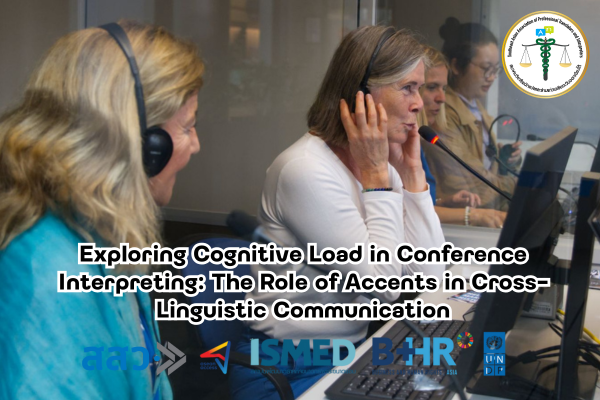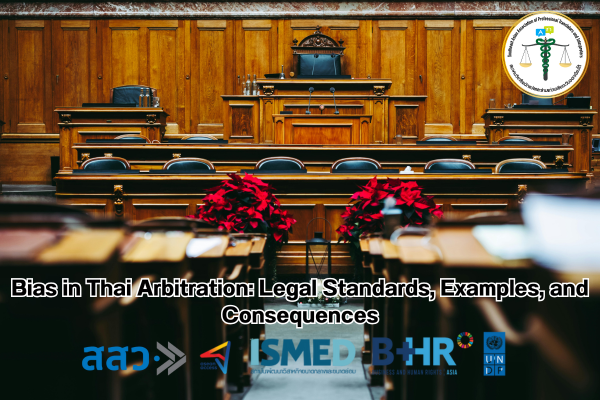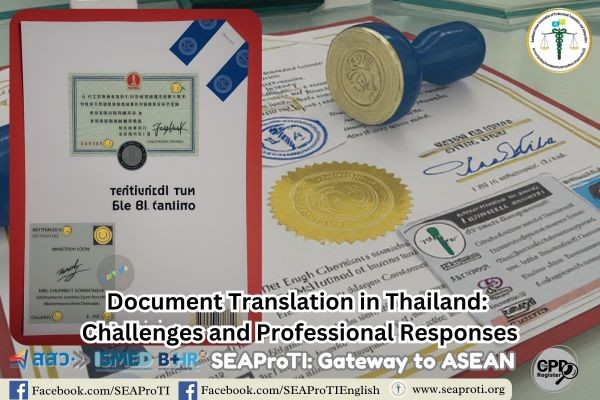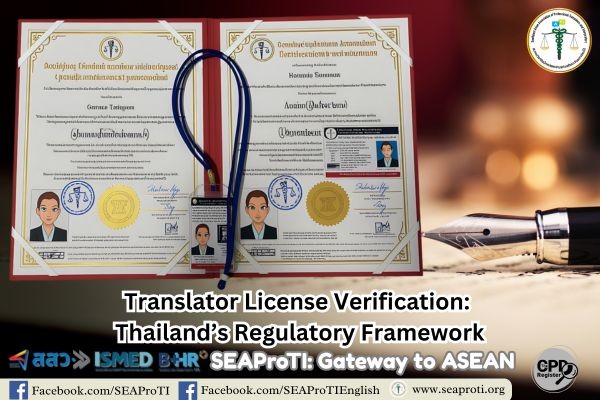Exploring Cognitive Load in Conference Interpreting: The Role of Accents in Cross-Linguistic Communication
11 May 2025, Bangkok – Conference interpreting is a highly complex linguistic process that demands proficiency in languages, subject-matter expertise, and the ability to process information in real time. However, one often-overlooked factor in the study and practice of interpreting is the impact of speaker accents on the interpreter’s cognitive load. This dimension plays a crucial role in shaping interpreting performance and communicative success.
Accents: The Hidden Challenge
Although interpreters are trained to comprehend a variety of linguistic registers and speaking styles, accents introduce a unique layer of difficulty. Accents affect pronunciation, rhythm, and intonation, requiring interpreters to allocate more cognitive resources simply to understand the speaker. This increased mental effort can reduce the interpreter’s ability to accurately and fluently convey the message in the target language.
Examples:
- A French interpreter familiar with Parisian French may find Quebecois French more difficult to process due to distinctive pronunciation and idiomatic expressions.
- An English interpreter may struggle when interpreting speakers with strong Scottish or Indian accents if they have limited exposure to these regional varieties.
Cognitive Load: Concepts and Application
Cognitive load refers to the amount of mental effort required to process new information. In conference interpreting, cognitive load increases significantly when:
- The speaker’s accent is unfamiliar.
- The speaker speaks at a fast pace, allowing little time for adjustment.
- The interpreter must simultaneously decode the speech and render it in the target language.
Strategies for Managing Accent-Related Cognitive Load
Experienced interpreters often adopt the following strategies to mitigate the effects of increased cognitive load due to unfamiliar accents:
- Pre-Event Preparation
Interpreters often listen to sample recordings of the speaker or similar accents in advance to acclimate their auditory processing systems. - Predictive Listening
Interpreters use contextual knowledge, linguistic cues, and familiarity with the subject matter to anticipate content, thereby reducing the need for real-time decoding. - Practice and Exposure
Regular exposure to a wide range of accents enhances cognitive flexibility and prepares interpreters to adapt to linguistic variability more efficiently.
The Role of Event Organizers in Supporting Interpreters
While managing cognitive load is primarily the interpreter’s responsibility, event organizers play a critical supportive role. Measures that can reduce accent-related challenges include:
- Providing background information about the speaker, such as linguistic or cultural background.
- Supplying sample audio recordings, if available.
- Organizing brief pre-event meetings between interpreters and speakers to build familiarity and establish communication strategies.
Conclusion
Accents are not merely linguistic curiosities; they have a significant impact on cognitive load in conference interpreting. Awareness and proactive management of this factor are essential for effective multilingual communication. By addressing the challenges posed by accents, both interpreters and organizers can contribute to the overall success of international events and promote meaningful cross-cultural understanding.
SEAProTI’s certified translators, translation certification providers, and certified interpreters:
The Southeast Asian Association of Professional Translators and Interpreters (SEAProTI) has officially announced the criteria and qualifications for individuals to register as “Certified Translators,” “Translation Certification Providers,” and “Certified Interpreters” under the association’s regulations. These guidelines are detailed in Sections 9 and 10 of the Royal Thai Government Gazette, issued by the Secretariat of the Cabinet under the Office of the Prime Minister of the Kingdom of Thailand, dated July 25, 2024, Volume 141, Part 66 Ng, Page 100.
To read the full publication, visit: the Royal Thai Government Gazette
การสำรวจภาระทางปัญญาในการล่ามประชุม: บทบาทของสำเนียงในการสื่อสารข้ามภาษา
11 พฤษภาคม 2568, กรุงเทพมหานคร – การล่ามประชุม (Conference Interpreting) เป็นกระบวนการทางภาษาที่ซับซ้อนซึ่งต้องอาศัยทักษะทั้งด้านภาษา ความรู้เฉพาะทาง และความสามารถในการประมวลผลข้อมูลแบบเรียลไทม์ อย่างไรก็ตาม ปัจจัยหนึ่งที่มักถูกมองข้ามในการศึกษาหรือฝึกฝนวิชาชีพนี้ คือ ผลกระทบของสำเนียง (Accents) ของผู้พูดที่มีต่อ ภาระทางปัญญา (Cognitive Load) ของล่าม
สำเนียง: ความท้าทายที่ซ่อนอยู่
แม้ล่ามจะได้รับการฝึกฝนให้สามารถเข้าใจความหลากหลายของภาษาและรูปแบบการพูดต่าง ๆ แต่สำเนียงกลับเป็นปัจจัยที่เพิ่มความซับซ้อนให้แก่กระบวนการแปลอย่างมีนัยสำคัญ เนื่องจากสำเนียงส่งผลต่อ การออกเสียง จังหวะเสียง และทำนอง ของการพูด ทำให้ล่ามต้องใช้ทรัพยากรทางจิตใจมากขึ้นในการประมวลผลคำพูดของผู้บรรยาย ซึ่งส่งผลให้ความสามารถในการแปลสารและถ่ายทอดความหมายลดลง
ตัวอย่างเชิงเปรียบเทียบ:
- ล่ามภาษาฝรั่งเศสที่คุ้นชินกับสำเนียงปารีเซียง (Parisian French) อาจพบความยากลำบากในการฟังและแปลภาษาฝรั่งเศสแบบเคเบก (Québécois French) ซึ่งมีรูปแบบการออกเสียงและสำนวนเฉพาะถิ่น
- ล่ามภาษาอังกฤษที่ไม่คุ้นเคยกับสำเนียงสกอตแลนด์หรืออินเดีย อาจต้องใช้เวลาปรับตัวเพิ่มขึ้นขณะปฏิบัติงาน
ภาระทางปัญญา: แนวคิดและการประยุกต์
ภาระทางปัญญา (Cognitive Load) คือ ปริมาณความพยายามทางจิตใจที่บุคคลใช้ในการประมวลผลข้อมูลใหม่ ในบริบทของการล่ามประชุม ภาระนี้จะเพิ่มขึ้นอย่างชัดเจนเมื่อ:
- สำเนียงของผู้พูดไม่คุ้นเคย
- ผู้พูดใช้ความเร็วในการพูดสูง
- ล่ามต้องตีความและแปลพร้อมกันในทันที
กลยุทธ์ของล่ามในการจัดการภาระทางปัญญา
เพื่อรับมือกับภาระทางปัญญาที่เพิ่มขึ้นจากสำเนียง ล่ามผู้มีประสบการณ์มักใช้กลยุทธ์ดังต่อไปนี้:
- การเตรียมตัวล่วงหน้า
ล่ามมักฟังตัวอย่างเสียงของผู้พูด หรือเสียงของผู้ใช้สำเนียงเดียวกันก่อนเริ่มงาน เพื่อให้สมองคุ้นชินกับลักษณะเฉพาะของเสียง - การฟังแบบคาดเดา (Predictive Listening)
ล่ามใช้ความรู้ทางบริบท โครงสร้างภาษา และความคุ้นเคยกับเนื้อหาในการคาดเดาสิ่งที่ผู้พูดจะกล่าว ซึ่งช่วยลดภาระในการประมวลผลแบบเรียลไทม์ - การฝึกฝนและการได้รับสัมผัสกับสำเนียงที่หลากหลาย
การฟังและฝึกแปลจากผู้พูดที่มีสำเนียงต่างกันอย่างต่อเนื่อง จะช่วยให้ล่ามมีความยืดหยุ่นในการทำงานมากขึ้น
บทบาทของผู้จัดงานในการสนับสนุนล่าม
แม้ว่าการจัดการภาระทางปัญญาจะเป็นหน้าที่ของล่ามส่วนหนึ่ง แต่ผู้จัดงานหรือผู้ประสานงานก็มีบทบาทสำคัญในการลดอุปสรรคทางภาษาที่เกิดจากสำเนียง เช่น:
- การจัดเตรียม ข้อมูลผู้พูด ล่วงหน้า (เช่น ประวัติการศึกษา ภูมิหลังภาษา)
- การให้ ตัวอย่างเสียงของผู้พูด หากเป็นไปได้
- การจัด การประชุมสั้นล่วงหน้า ระหว่างล่ามและผู้พูด เพื่อสร้างความคุ้นเคยและประสานแนวทางการสื่อสาร
สรุป
สำเนียงมิใช่เพียงปรากฏการณ์ทางภาษาที่น่าสนใจ หากแต่มีผลกระทบอย่างมีนัยสำคัญต่อภาระทางปัญญาในการล่ามประชุม การตระหนักถึงบทบาทของสำเนียงและการจัดการกับภาระดังกล่าวอย่างเหมาะสม ไม่เพียงช่วยให้การแปลมีประสิทธิภาพยิ่งขึ้น แต่ยังเป็นกุญแจสำคัญในการส่งเสริมความเข้าใจระหว่างวัฒนธรรมในเวทีระหว่างประเทศ
เกี่ยวกับนักแปลรับรอง ผู้รับรองการแปล และล่ามรับรองของสมาคมวิชาชีพนักแปลและล่ามแห่งเอเชียตะวันออกเฉียงใต้
สมาคมวิชาชีพนักแปลและล่ามแห่งเอเชียตะวันออกเฉียงใต้ (SEAProTI) ได้ประกาศหลักเกณฑ์และคุณสมบัติผู้ที่ขึ้นทะเบียนเป็น “นักแปลรับรอง (Certified Translators) และผู้รับรองการแปล (Translation Certification Providers) และล่ามรับรอง (Certified Interpreters)” ของสมาคม หมวดที่ 9 และหมวดที่ 10 ในราชกิจจานุเบกษา ของสำนักเลขาธิการคณะรัฐมนตรี ในสำนักนายกรัฐมนตรี แห่งราชอาณาจักรไทย ลงวันที่ 25 ก.ค. 2567 เล่มที่ 141 ตอนที่ 66 ง หน้า 100 อ่านฉบับเต็มได้ที่: นักแปลรับรอง ผู้รับรองการแปล และล่ามรับรอง

























